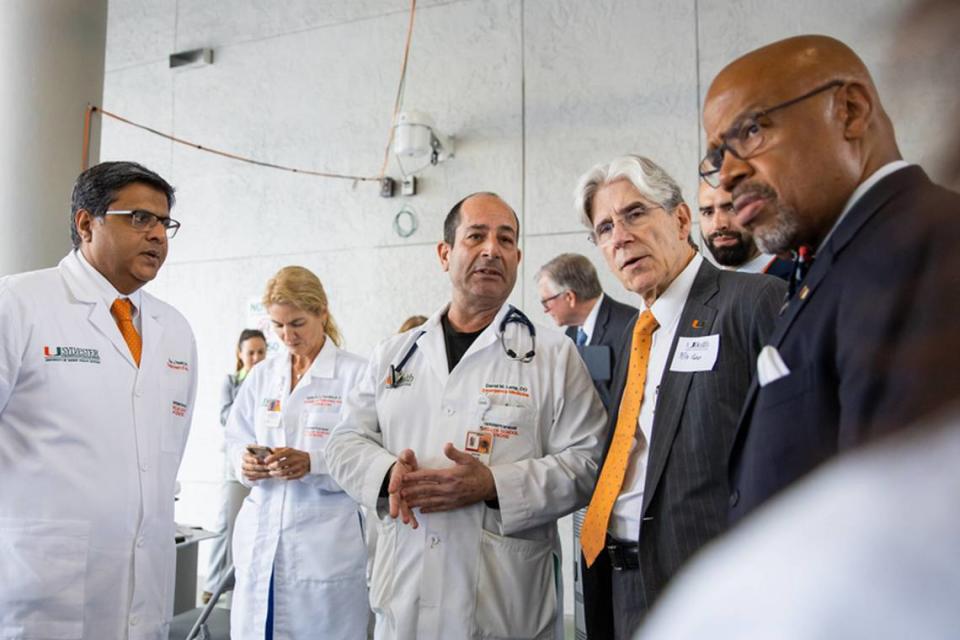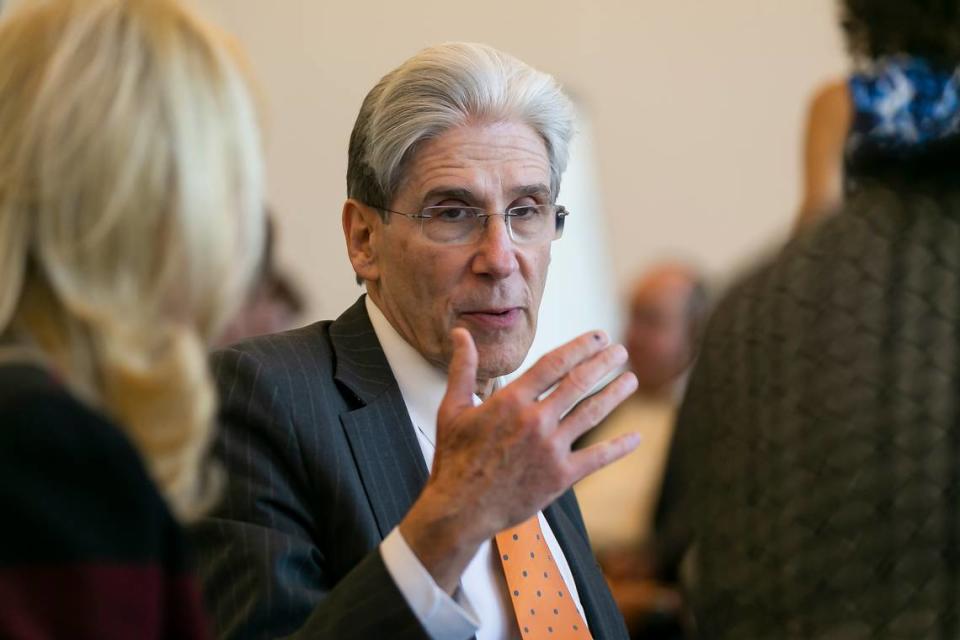He advised the world during four pandemics. Now he leads UM during coronavirus crisis
When news first began to trickle out of Wuhan, China, at Christmastime about a strange, super-contagious sickness that may have originated in bats at a live animal market, University of Miami President Julio Frenk saw in his mind’s eye a world map turning dark shades of red, as if covered by a widening blood stain.
A man of science not given to melodrama, Frenk quickly but calmly convened a meeting of his emergency operations team at UM. Coronavirus was coming, he said. It was only a matter of when and how hard the invasion would hit.
To Frenk, one of the world’s foremost public health experts, the disease christened COVID-19 was an inevitable sequel. He had been on the front lines during four previous pandemics, including the 1981 Human Immunodeficiency Virus, or HIV/AIDS; the 2002 Severe Acute Respiratory Syndrome, or SARS; the 2009 H1N1 swine flu; and the 2014 Ebola outbreak.
But Frenk predicted that the novel coronavirus would be more difficult to contain than the others he’d confronted during his career as a physician, Mexico’s secretary of health, an executive at the World Health Organization, senior fellow for global health at the Bill and Melinda Gates Foundation and dean of Harvard’s T.H. Chan School of Public Health.
He was correct. The worldwide toll: More than 2.2 million confirmed cases and 146,000 deaths.
“The essential attribute of this public health emergency is uncertainty,” Frenk said. “It’s a novel pathogen — a new germ. It’s the first time the human race has encountered this virus.”
COVID-19 operates like a stealthy double agent. Its cunning complexity derives from its ability to hide in plain sight.
“COVID-19 is unlike any other in my lifetime because of its spread and depth of impact in each country,” Frenk said. “It is more challenging than any other because people who are healthy or showing no symptoms can infect others. With Ebola or SARS, people were not asymptomatic; they were very obviously very sick.
“In addition, COVID-19 is transmitted so easily via invisible droplets. No intimate contact is required. So we’ve had to implement social distancing and stay-at-home orders which have led to unprecedented economic consequences. We’re dealing with two emergencies — health and fiscal — at once.”

The lightning-spread of the coronavirus contagion meant the standard public health containment strategy could not be sustained for long.
“We always start with containment, tracing contacts and isolation,” Frenk said. “But what happened this time was the disease became rapidly entrenched through community transmission. Then you have to shift to mitigation measures, and asking everyone to self-quarantine and separate themselves from others. That makes it more difficult to flatten the curve.”
Frenk drew on his experience to prepare UM’s 17,000 students and 18,000 faculty and staff. He knew he would have to lock down the Coral Gables campus while ramping up the UHealth system and Miller School of Medicine.
“Dr. Frenk’s background as a doctor and public health authority put us in a unique position to respond quickly, starting in early January,” said Matthew Shpiner, UM’s director of emergency management. “We didn’t have to wait on more information because Dr. Frenk recognized it as a global pandemic right away.”
In his five years as UM president, since succeeding Donna Shalala in 2015, Frenk, 66, has led the campus through preparations for three major hurricane threats — Matthew, Irma and Dorian — and his crisis team knew what to expect, Shpiner said.
“Although a virus is a lot more unpredictable than a hurricane, he emphasized planning even before there was a single case in the United States,” Shpiner said. “He always emphasizes decisiveness and transparent communication. I’ve seen both sides of him, the reserved, analytical, thoughtful side and his passionate, energetic, urgent side. He gives us the confidence to do our jobs.”
UM makes contingency plans, finances coronavirus research
By the onset of spring break in early March, the campus population was reduced by 95 percent to a few hundred students, researchers, faculty, food service personnel, tech troubleshooters and police officers as UM switched over to online learning.
Meanwhile, personal protection supplies were ordered for UM’s healthcare workers, hospital staffing contingency plans were made, and elective surgeries were postponed to conserve bed space.
“UHealth is the only academic health system in South Florida providing critical and highly specialized care to very ill patients, giving us a vital responsibility to our community,” Frenk said. “We expanded our emergency capacity and we’re ready to meet the surge.”
UM is also funding 24 fast-track coronavirus research projects, including investigations on vaccines, an oral rinse detection test, adapting prostate cancer drugs and nitric oxide treatments for COVID-19 patients, protections for doctors and nurses in high-risk exposure circumstances and innovative mental health therapies.
Frenk agreed to become temporary CEO of the UHealth system when asked to step up by the board of directors upon the April 3 retirement announcement by Dr. Edward Abraham. It made sense for Frenk to take the helm during the height of the crisis.
“Dr. Abraham led a dramatic financial recovery for UHealth, which has had its two best financial years under his leadership,” Frenk said. “He had already decided he would retire at the end of the school year.
“Then came coronavirus. Models show we will probably peak in Miami in May and have acute demand for care into June. We decided it’s not a good idea to have CEO turnover during this period so let’s mobilize my own expertise and have a timely engagement for the crisis.”
Frenk relishes the adrenaline injection of his multi-dimensional role.
“I grew up with a strong work ethic and I’ve simply expanded my days,” he said. “I like being more hands-on. I like the sense of focus that an emergency requires. Every crisis opens up opportunities for improvement.”
Frenk is a fourth generation doctor on his father’s side. His grandfather fled Nazi Germany and found refuge in Mexico City, where Frenk was born.
“Mexico opened its arms to my family. I and my six siblings grew up with a strong sense of giving back, of reciprocating the generosity that saved our parents’ lives,” Frenk said. “I channeled that through medicine and public service. I chose to devote myself to public health to have the largest impact.
“I decided to make the whole of society my patient.”

Frenk, architect of Mexico’s Seguro Popular public health system, is worried about his native country’s response to the coronavirus.
“In Latin America, Chile, Peru and Colombia have done a good job, but Mexico and especially Brazil initially trivialized the pandemic and lost precious time,” Frenk said. He noted that Sweden, a small, prosperous, homogeneous country of 5 million is taking a radically different laissez-faire approach “that would not work in societies with higher levels of poverty and inequality.”
“I hope every country understands none is immune. This virus is not going to take care of itself. In the U.S. we’re seeing an amazing example of everyone doing their part. We’ve been shaken by what we’ve seen in New York.”
National leaders, including President Donald Trump, made the same mistakes their predecessors made during past pandemics when they failed to explain clearly what their citizens were facing, Frenk said.
‘When I was at WHO [World Health Organization], we used to say there are communicable diseases and then there are communicated diseases, those spread by rumor and panic,” Frenk said. “Credible, consistent, constant and concise communication is one of the keys to lowering anxiety. People want certainty — when will it end? We don’t know but with each passing day we get more data we can explain to the public.
“It makes people nervous when political leaders contradict medical experts. Political leaders don’t like to cause panic. But they have to give realistic expectations so people prepare properly. It is a delicate balancing act. You don’t want doomsday scenarios and you don’t want to minimize it by saying, oh, this is only in China and Italy.”
Worries about a second wave
The possibility of a second wave weighs heavily on Frenk. He’s studied the 1918 H1N1 or Spanish flu epidemic, when the second wave caused by a relaxing of restrictions blanketed certain U.S. cities in the fall — and was deadlier than the first.
”We need to get out of the mindset of pitting the economy versus health,” he said. “We need a synergistic response. The economic emergency will outlive the public health emergency. We must scale up diagnostic testing. If we stop social distancing too early, more people will die.
“There’s nothing worse for the economy than a second wave, although I’m confident that by then we will have solved the testing problems and should have more effective medicines. More than 70 compounds are being researched right now.”
Frenk, wearing his trademark orange tie as he spoke via Zoom from his office, turned philosophical when asked whether the coronavirus was a harbinger of apocalypse on unhealthy planet Earth.
“Is the virus an existential threat to humankind? No, but it’s a very strong warning,” he said. “These pandemics emerge because of human actions. Diseases found in animals jump the species barrier because we allow wet markets with animals kept in inhumane conditions in close proximity to us. We utilize mass production techniques for chicken and swine. Avian and swine flu were related.
“Will the next pandemic wipe out the human race? No, but human activity has increased the frequency of pandemics. We live in a highly interconnected world, and we’re not the only inhabitants. By destroying habitats, adopting non-sustainable practices and raising livestock in unsanitary conditions we put ourselves at risk. We’re experiencing record rates of extinction and escalating rates of global warming. We can’t continue down this path of unrestrained development.”
Frenk has immersed himself in mass misery for four decades, but hope propels him — hope and his faith in education. Maybe this time around, hard lessons learned won’t be forgotten when masks and ventilators are stored away.
“COVID-19 can be a wake-up call,” he said, recalling how when the Zika outbreak faded so did funding for a rapid diagnostic test. “With an infinitesimal fraction of the money that’s been lost in the stock market governments can fund robust investments in public health. Most immediate are the tests, drugs and vaccines we’ve been pleading for for 20 years. We have to build a permanent capacity even when not using it. You don’t assemble a firefighting force when you have your first fire.
“We cannot afford complacency until the next one. And there will be a next one. We are not in a new normal. We are in abnormal from now on.”
